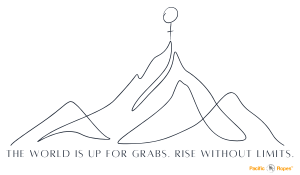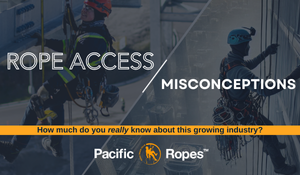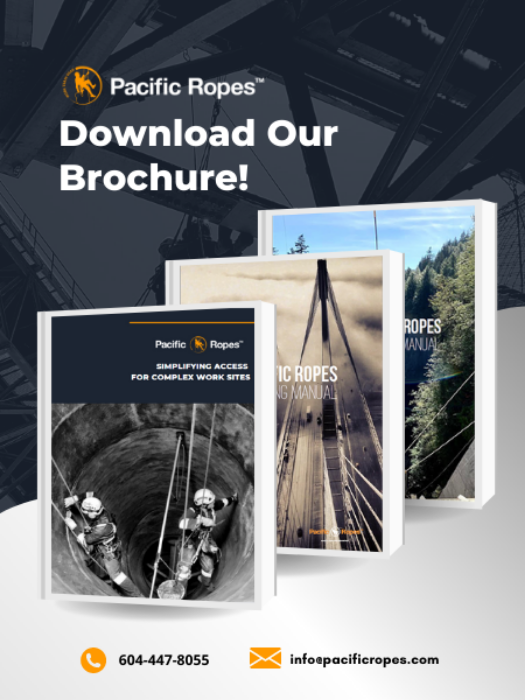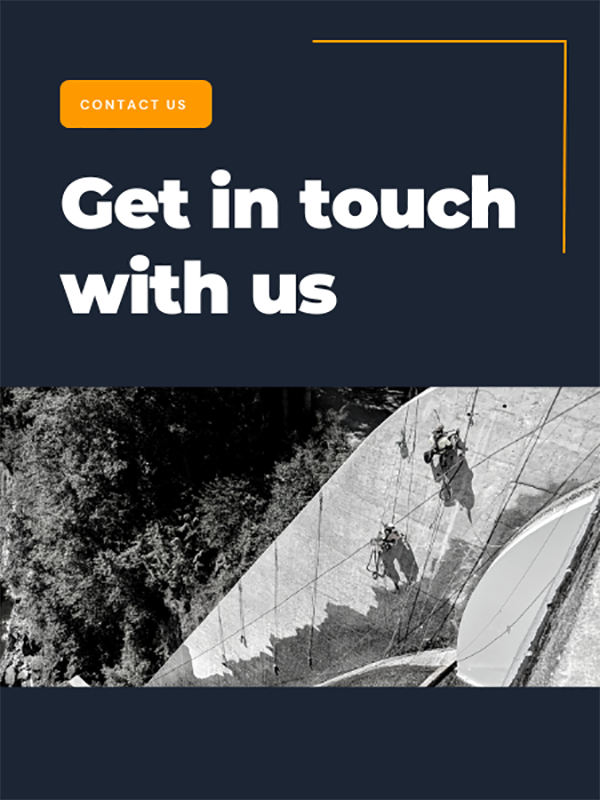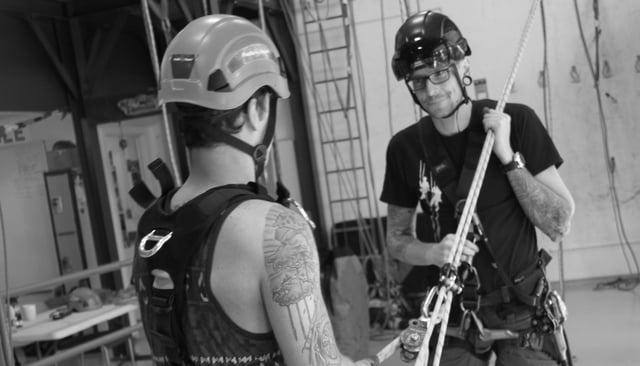
Josh is quite the guy! Coming from the academic field of Philosophy, Josh has an amazing perspective on life and all things Rope Access.
Working on our contracting end for 3 years and beginning his training career this year, Josh is highly knowledgeable on our contracting side as a Rope Access Technician and brings an incredible depth to his training style. Ready to visit Pacific Ropes? This guy will be there to give you all the advice you need to move forward.
How did you get your start in Rope Access and why?
When I was eleven years old or so, I found a little climbing gym near my hometown and fell in love with being up high, so super exposed (for a kid), and dangling from a rope! What’s not to like? I never looked back as far as being at-height and climbing was concerned. I continued rock climbing and instructing others on exactly how to stay safe right through my adolescents for over a decade. It was a natural progression to move forward from there- How can I make this into a career? It became a toss up between becoming a climbing instructor for life or to make a move into the world of Industrial Rope Access. My philosophy degree was not leaving many options in the “help wanted” section of the newspaper. I was introduced to it from a climbing partner and colleague at the time, Maxime Dugal (he just destroyed at the Petzl Ropetrip this year). He has always been, and continues to be, a huge inspiration to me as a climber/Rope Tech and definitely encouraged me to take it to that next level. I love the “at-height” community and there was no chance I was leaving it, so Rope Access became that natural progression.
Further than that, I was attracted to the redundancy and inherent safety of this very developed system, for example, the dual rope/all the legislation and training. Working in a climbing gym and climbing outdoors among (relatively) untrained people, I’ve seen accidents that could have easily been mitigated and that really set me off on a path of education and SAFETY first! They used to joke at the climbing gym that “safety” was my middle name; not as cool as “danger”, but arguably you’d rather have me belay for you!
What was your career in Rope Access like before you started instructing full-time?
I started working mostly in the renewable energy sector on wind turbines in Ontario and Quebec. Living in Toronto and working all over Quebec really combined my love for hanging on rope with my love for road-tripping. I drove to most every job, sometimes 18 hours away at a time, and from there was able to travel all over this beautiful country. Climb wherever I was, maybe a hop skip and a jump to the east coast for some bouldering. It was great, I think it is the big attraction to a lot of rope techs who like to travel. I stayed “local” to Canada, but it can really take you all over! (Just read a bit about Don Gibbons!)
But you’re asking about the career part, right.? That definitely happened as well. I was really lucky to have so much work on wind turbines, that’s one thing that is lacking in the West! They are great structures and really allowed me to get my feet wet as far as industrial rope access goes. Simple rigging, but a lot of time on the rope, and working in suspension!
In the past 3 years, working with Pacific Ropes, I’ve been able to really dive right into the bridges and confined spaces and cyclones and towers and all the diverse range of sites that we can access with rope. See, it’s not just a clever name.
But in all seriousness it really can be quite a puzzle: We need to get there, we have some anchors here and here, let’s make a plan!
To answer the question properly though, I hope I can continue to balance the instructing with working in the field, I’m not quite done working on the tools. I have a lot more experience to get and a lot of work ahead of me before I am instructing full time! I also want to work towards assessing and that’s another challenge altogether!
When did you make the transition to become a Trainer?
I’m relatively new to training in Rope Access, I started assistant training at Pacific Ropes in January 2015. I’m currently still in the process of getting that Instructor “i” next to my IRATA number. There are a certain number of training hours and students that are required before you can get that official INSTRUCTOR status and it will mean you can teach more students at a time. I’ve seen a fair number of students through, but can never get enough experience before moving ahead. By the end of the summer I hope to get that all squared away and then can start working on my assessor ticket ![]()
That being said, I’m still not ready to leave the field for good. It’s a nice little balance for me in between contracts and an awesome way to stay up on my skills and technical knowledge in an ever-growing and changing industry.
What is the most common question your friends ask you when they want to know ‘what do you do?’
Besides the classic, “Industrial Rope Access? What is that?” “Well you know, it’s accessing hard to reach places in industrial settings …with ropes.”
The second question is always “Isn’t that dangerous?” or “So, I guess you’re not afraid of heights?” I know a lot of rope techs who have resorted to just saying, “I work in construction” it’s a much easier thing for people to process. There is a proper answer for all these questions of course, but usually people just want to hear that you hang off things at crazy heights, I mean who wants to hear about repairing concrete or fiberglass in detail. Or painting people’s balconies or cleaning their windows, the excitement for most people is the exposure and crazy factor! But the real answer is that it is the safest way to work at height that I am aware of, and because of that, my fear of heights is subsided because I trust my gear and my team. Everyone is ‘afraid’ of heights. It’s an evolutionary instinct to keep you alive but if you feel safe or at the very least in control of your abilities, you minimize that feeling no matter how exposed you appear to be.
Are there any characteristics of a person who would make a great rope tech in your opinion—I mean, heights are not for everyone!
Heights are definitely not for everyone, and working there for hours at a time, doubly so; it requires a healthy respect for heights and a focused mind. There are definitely a bunch of qualities that good rope techs possess, but my number one, and something I always try to work on for myself as well, is patience.
I was told early on, and continue to believe, that you can tell a good rope tech by throwing them a rats nest of tangled rope and saying you can leave when it’s untangled. It takes some serious patience to do that and keeping your head while you fight with a tangled rope can be a real test, even on the ground. 90 meters up in the wind and rain and cold, managing your system and your ropes can be frustrating.
Being calm and collected, and maintaining your sense of humor will make you a pleasure to work with and ultimately make your time at work more enjoyable, and safer. We often work long hours in harsh conditions and keeping your wits about you is paramount to success.
What’s your favorite part of being on a job site?
Every site is different and so there will definitely be different aspects of each job that are appealing. Working on turbines was absolutely about the environment. Typically spread out over vast rolling hills and mountainous backdrops. Besides the satisfaction of a job done well, the views from ‘my office’ are always slightly surreal.
That being said, there are also the jobs when you’re deep inside a confined space surrounded by concrete dust and wearing more PPE than a storm trooper, which has it’s own appeal but for different reasons. In that situation it definitely becomes about the personal satisfaction that is, “Hey! I was in this terrible, terrible space to do something important and useful.” If you don’t look at it that way it will take its toll.
What is your biggest piece of advice for someone thinking about getting their Level 1 IRATA/SPRAT?
Absolutely, go for it! Whether you want to add to your current trade or you’re just looking for an opportunity to get out there and work at height, maybe clean some windows! It’s a great experience, and for someone driven and hardworking there will always be a job.
If you’re adding to your current trade, there is a high demand for welders with rope tickets: Pipefitters, Insulators, you name it. Non-Destructive Testing (NDT) is also an excellent combination. There will never be a shortage of things that need inspecting!
Where do you see the future of your trade in Rope Access in Canada?
It’s exciting because people still don’t know who we are. It’s still a new thing in BC really and all over Canada. There is still only just discussion of Provincial legislation in Ontario from what I understand and it’s only been in the past year that WorkSafe BC introduced Part 34, which directly relates “Rope Access” to the legislation.
The majority of Part 34 refers the user to SPRAT and IRATA documentation, which is great, but there are still many facets of work on rope that operate outside this legislation, simply because of the lack of a unified system among workers at-height. It would be nice to see a uniformity there and we could all kind of enter the new generation of working at height. There is a reason there are so few accidents in Rope Access, and it would be nice to see that education carried over, and definitely some of the resistance I’ve felt in past years has gotten better. There is a lot more acceptance once people understand what we preach.
What is the greatest challenge you face as a trainer?
I have had the pleasure of working with a handful of fantastic trainers and got to see a plethora of different teaching styles and techniques and spent the first months really soaking it in, trying to get a real understanding of the students and how people learn, what works for people and what does not. I’ve come to realize that no matter how many different people you meet, there is no cookie cutter training that will be 100% effective across the board. It’s absolutely necessary to know your students and teach them based on their unique experiences and different personalities. That means that while there is a curriculum, no two courses will ever be the same, and that always keeps me on my toes. But it’s fitting, because no two jobs in the field are ever the same either, adjusting the formula is always the biggest challenge, but arguably what makes this line of work so interesting.
What is the biggest thing you want to tell people about Rope Access training and work?
While I’ve never actually skinned a cat, I understand there are many different ways to do it. You hear this adage a lot among Rope Access Technicians and it is definitely pertinent to this industry. It is easy to get caught up in ‘your own way’ of doing things. Keep an open mind and really soak up as much as you can. Diversify your techniques and you can do anything!
What continues to inspire your life as someone who has given their professional life to Rope Access?
Humans inspire me constantly. I’ve met so many interesting and inspiring people through the rope access community. Whether it just be their personalities or desire to further their careers or just about views on life! Being in the training center has introduced me to all kinds of people from all different facets of rope work and life, for that matter! I’m inspired by all of the people who come through the training center, and it sounds like a cliché, but I can’t even call them students, we all learn from each other and I’m constantly looking for new perspectives and ideas. That’s what keeps me coming back to training and will continue to drive me in the future.
What was your favorite work site?
While almost every rope tech working in the lower mainland knows and has likely worked on this site, the Portmann bridge was definitely the most exciting site I’ve been a part of. 160m off the Fraser River, 90 meters off the bridge deck, constant flow of traffic, high winds with snow and ice? Yes please. Sign me up. Stunning views and hard work.
Why Pacific Ropes?
Every company I’ve ever worked for has been relatively small operations at their core. I like the idea of working for a company where everyone knows one another, and who is suited for what jobs, and there is open dialogue between everyone. Beyond that though and especially in the past year, it’s been really exciting to be a part of a growing company with such an awesome team and ownership. It really is like a family and it’s growing all the time.
Want to read some more questions answered by a rope tech? Click below!

